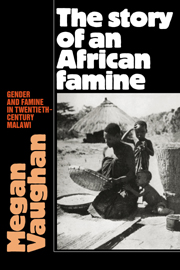Book contents
- Frontmatter
- Contents
- List of maps
- List of illustrations
- Preface
- Glossary
- Introduction
- 1 The 1949 famine
- 2 Famine as a Malthusian crisis
- 3 Famine as a failure of the market
- 4 Food entitlement and employment
- 5 Gender and famine
- 6 After the famine: a conclusion
- Notes
- List of oral interviews
- Bibliography
- Index
4 - Food entitlement and employment
Published online by Cambridge University Press: 05 November 2009
- Frontmatter
- Contents
- List of maps
- List of illustrations
- Preface
- Glossary
- Introduction
- 1 The 1949 famine
- 2 Famine as a Malthusian crisis
- 3 Famine as a failure of the market
- 4 Food entitlement and employment
- 5 Gender and famine
- 6 After the famine: a conclusion
- Notes
- List of oral interviews
- Bibliography
- Index
Summary
The immediate post-war period in Malawi was one of quite rapid economic change. In Southern Malawi long-term changes such as population growth combined in this period with an increase in wage employment (both within and outside the country), the enforcement of government conservation regulations in agriculture, and the increased circulation of money within African communities. We certainly need to look beyond purely agricultural production factors if we are to understand the nature of the famine, because in the area hardest hit a large percentage of households depended for their livelihood on a combination of wage-earning, agricultural production, and what would now be termed ‘informal sector’ activity.
As we have seen, an important feature of the 1940s in this area was the growth of the towns of Blantyre and Limbe, and the increase in public works in the district. This growth was allied to the post-war ‘tobacco boom’ which resulted, not only in the expansion of estate and peasant tobacco production, but also in generally higher levels of investment in urban property. For the people of Blantyre District and neighbouring districts this meant that there was an increased demand for labour in the area – both skilled and unskilled – and wage-levels rose. To some extent, then, the increasing congestion on Native Trust Land around Blantyre may have been a response to the increase in employment opportunities in the area and to the demand for service industries.
- Type
- Chapter
- Information
- The Story of an African FamineGender and Famine in Twentieth-Century Malawi, pp. 102 - 118Publisher: Cambridge University PressPrint publication year: 1987



